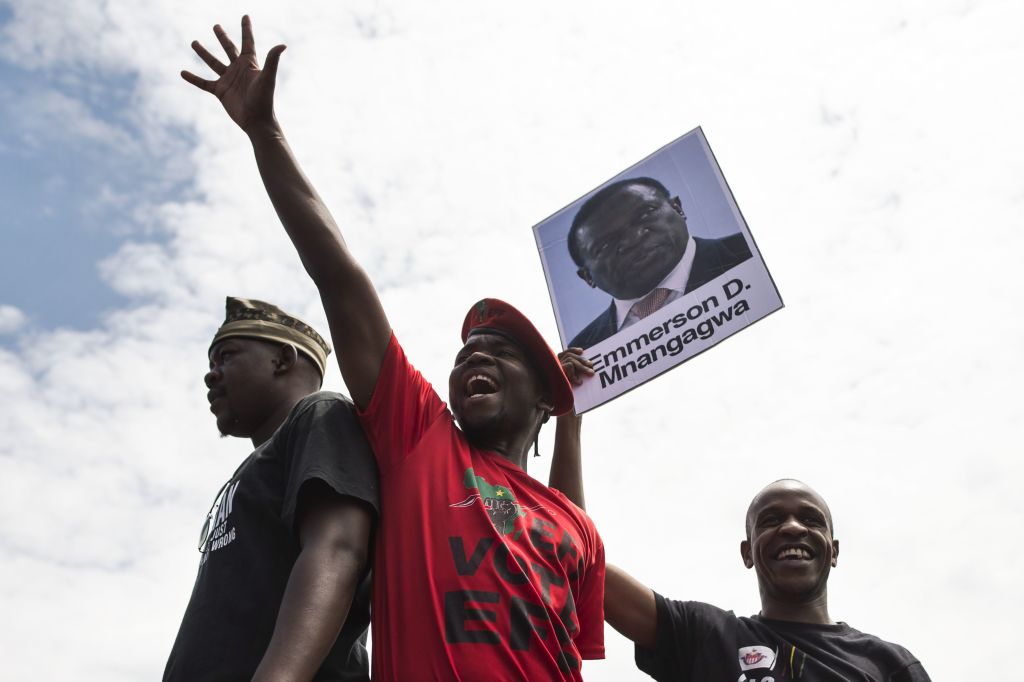Even for a veteran of the struggle for freedom and democracy in Zimbabwe, the events of the past week continue to shock. When Robert Mugabe refused to step down in his rambling TV address on Sunday, it seemed impeachment would be the only way to remove him from office. Proceedings to do just that started in parliament yesterday. We didn’t get far. The debate had been going for 40 minutes when the speaker interrupted proceedings to announce that he had received a letter from the president. When it came to the part about Mugabe ‘tendering his resignation with immediate effect’, the place exploded. It took several minutes to restore order and by the time we filed out, it seemed the entire country was out on the streets celebrating.
The festivities went on into the night, showing clearly that what has transpired over the last week has the support of the great majority of Zimbabweans. But after Mugabe’s fall, what next? The honeymoon period is likely to be short: the new President, Emmerson Mnangagwa, looks set to be sworn in this week. This gives whatever government comes in over the next few days very little breathing space before it must face up to the tough issues facing Zimbabwe.
The first of these is the national budget. The country will run a huge fiscal deficit this year after the £1.056bn ($1.4bn) deficit in 2016. The economy is shrinking, and inflation is suddenly accelerating. The budget is the only policy instrument available to the government to deal with this, and whatever was planned by the Minister of Finance (who is now in jail) will have to be reviewed and changes made. We have until the end of January to get this done – but there is a lot to do and this will take some time.
Next is the issue of reengagement with the international community. This political process must be concluded before any talk of an IMF guided stabilisation and a recovery plan to shore up the country can be considered. The new government has to persuade the international community that it has a plan to ensure free and fair elections as soon as possible so that the regime in Harare can replace its temporary legitimacy conferred by the street, with democratic credentials won at the ballot box. This process must be set out in clear terms with guidelines, targets and timelines.
This in itself will not be a short process. It will involve the full implementation of the 2013 constitution, the restoration of the rule of law and the independence of the judiciary and the removal of all restrictive legislation. An independent electoral commission will need to be appointed and the armed forces will need to be brought into line; the joint operations command, which has been responsible for much of the manipulation and rigging of elections in recent years, must also finally be disbanded. We will have to restore the independence of all traditional leaders in the country and ensure that the media is free and unfettered by the state in any way. The Movement for Democratic Change (MDC) leadership has already called for the next election to be supervised by the UN or one of its agencies. This is a tough call for the incoming administration but ignoring this will make progress impossible.
Once the doors to reengagement have been opened, the question of addressing Zimbabwe’s desperate economic situation will have to be properly answered. The fiscal deficit will need to be dramatically reduced from 15 per cent of GDP to three per cent in order that the IMF are able to begin work on a stabilisation and recovery program. Given that Zimbabweans are already heavily taxed, this will be no easy task for the new administration.
Another difficult task will be returning to the vexatious issue of land reform. This must be revisited and compensation paid to the farm owners who had their land taken from them.
Finally, the government is going to have to deal with the national debt which now stands at over £22.6bn ($30bn), if compensation paid to farm owners is included. All of this means the new government faces a difficult job, but it is not impossible. Whatever else the new president is planning, it is these issues that will occupy his time in the coming months. The honeymoon will be very short but, if he succeeds, Zimbabwe can finally hope for a brighter future.
Eddie Cross, a Member of Parliament for Bulawayo South, is a Zimbabwean economist and founder member of the mainstream Movement for Democratic Change party




Comments